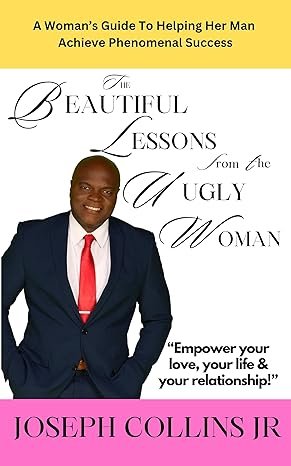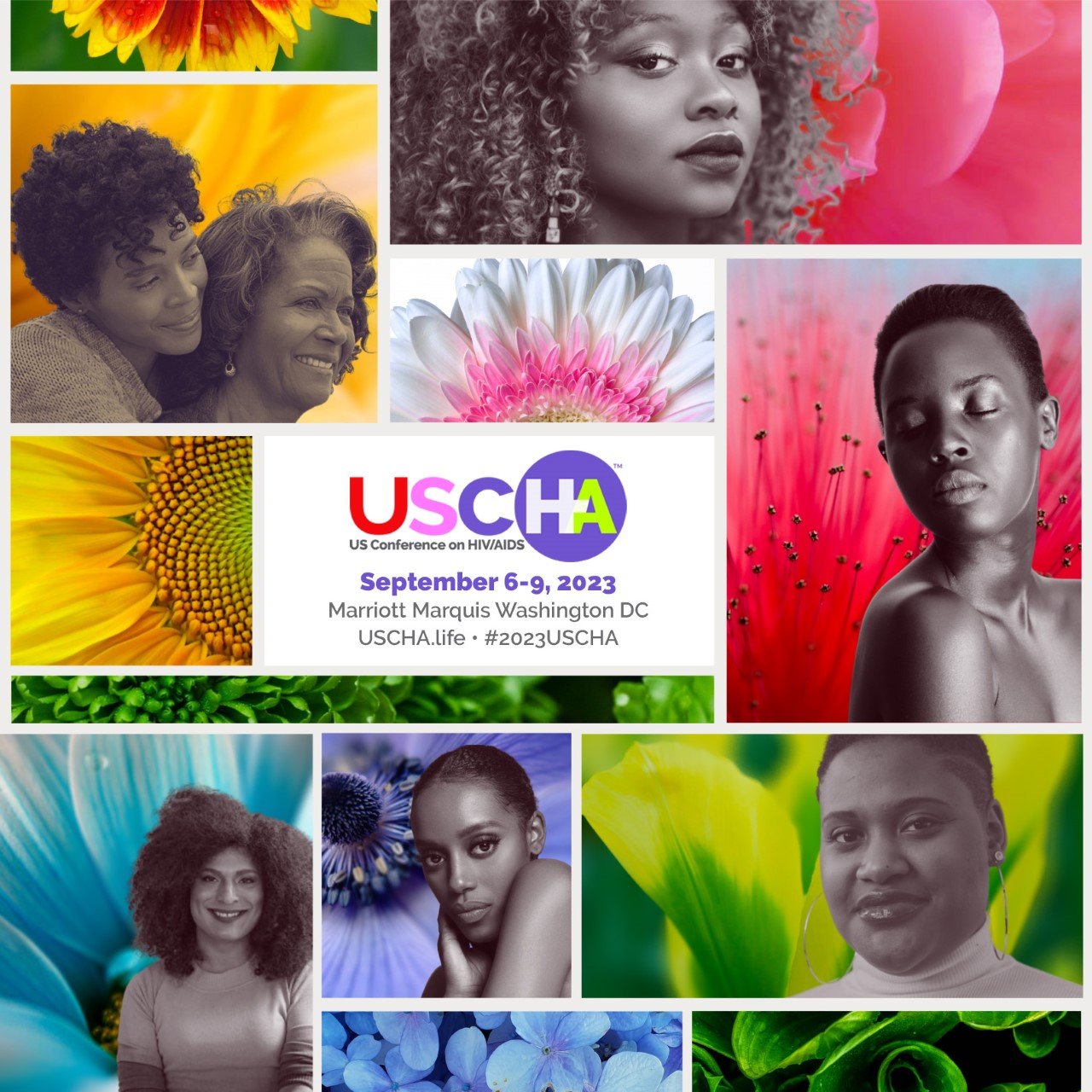
Day 1 - 2023 USCHA: A Love Letter to Black Women
Community News
Day 1 – 2023 USCHA: A Love Letter to Black Women
2023 USCHA: A Love Letter to Black Women. When more than a couple of Black women get together, this powerful mechanism for change is created.
Published
2 years agoon

Day 1 – 2023 USCHA: A Love Letter to Black Women. The Ending the HIV Epidemic in the United States (EHE) initiative was launched in 2019. The EHE aims to reduce new HIV infections by 90% by 2030. By implementing key HIV prevention and treatment strategies to achieve healthy equity with all communities while also addressing the epidemic. The EHE initiative encouraged jurisdictions to implement a whole-person approach to HIV prevention and care known as status neutrality. This person-centered approach addresses healthcare gaps and underserved support service needs of people living with or at risk of HIV.
Earlier this week, the 2023 United States Conference on HIV/AIDS (USCHA) was held at the Marriott Marquis in Washington, DC. The theme for this year was “A Love Letter to Black Women.”
Day 1: Wednesday, September 6, 2023
A Love Letter to Black Women
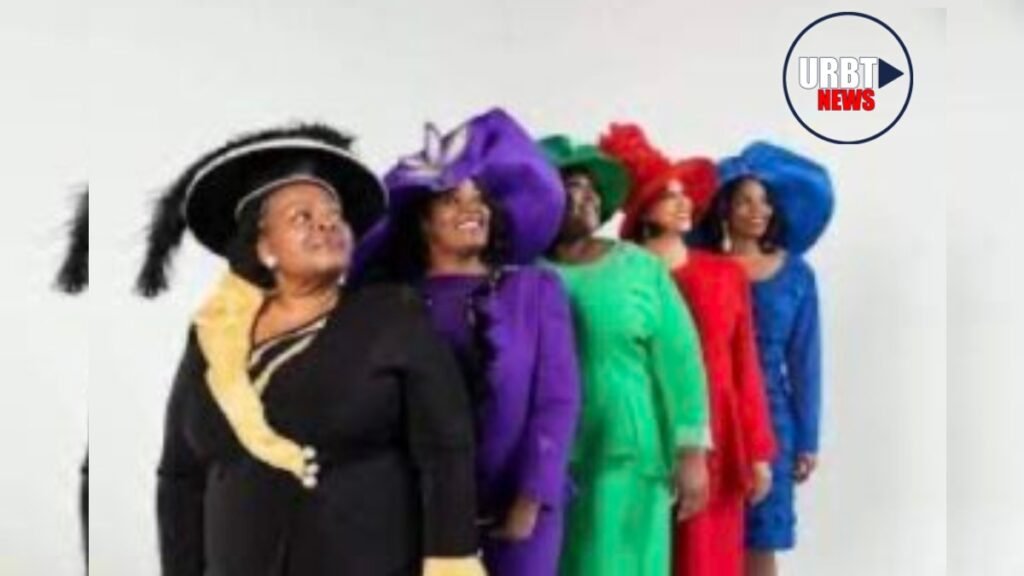
The United States Conference on HIV/AIDS is a safe space for people highly impacted by HIV. The gathering values diversity, equality, and justice. Attendees can be themselves in all their fabulosity. PHOTO: COURTESY OF: NMAC Dress Code, Published August 31, 2023.
The fights against HIV is far from over. 2023 USCHA celebrated and sent love to all the Black Women in our movement at the Opening Plenary. The plenary was titled “Opening Plenary: A Love Letter to Black Women.” USCHA shared stories, honored those we’ve lost, and highlighted current leaders on the frontlines. The Opening Plenary session also gave voice to the next generation. They are ready to take the lead in putting an end to the HIV epidemic.
Black women are “are the pillars of our strength,” proclaimed the reverend during the benediction.
Sweet Honey In The Rock®
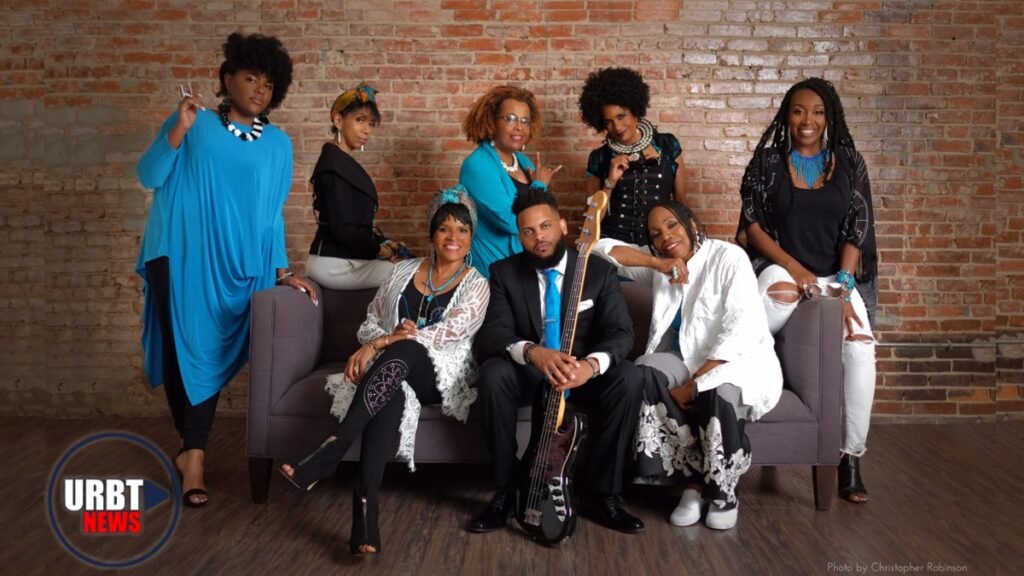
Picture: Sweet Honey in the Rock – (From Left to Right) Christie Dashiell, Nitanju Bolade Casel, Carol Maillard, Barbara Hunt, Romeir Mendez, Aisha Kahill, Louise Robinson, and Rochelle Rice. PHOTO: COURTSESY OF: Sweet Honey In The Rock® . (Photo by Christopher Robinson)
The women of Sweet Honey In The Rock® gave a soulful performance. Founded by Bernice Johnson Reagon in 1973 at the D.C. Black Repertory Theater Company, the group’s name was derived from a song, based on Psalm 81:16, which tells of a land so rich that when rocks were cracked open, honey flowed from them
Sweet Honey In The Rock® is an all-woman, African-American a cappella performance ensemble rooted in African American history and culture. The three-time Grammy Award–nominated troupe educates, entertains and empowers its audience and community through the dynamic vehicles of a cappella singing and American Sign Language interpretation for the Deaf and hard of hearing.
Sweet Honey’s audience and community comes from diverse backgrounds and cultures throughout the United States and around the world, and includes people of all ages, economic/education/social backgrounds, political persuasions, religious affiliations, sexual preferences and differing abilities.
Dandelion’s Movement

PICTURE: Dandelion’s Movement. PHOTO: COURTESY OF: Featured on Derinthia (Unique) Williams’ LinkedIn page.
The community of people living with HIV since birth or early childhood are lifetime survivors or “dandelions.” According to Antoinette Jones and Derinthia (Unique) Williams, co-Executive Directors of Dandelions, Inc., “The Dandelions Movement is a ‘For Us -By Us’ movement accountable for communities who identify as lifetime survivors of HIV.” Their mission is to free our community from isolation, stigma, violence, and discrimination. Dandelions, Inc. maintains a commitment to identifying 7,000+ Dandelions in the U.S and Globally. They also aim to create a space that encompasses safety, respect, and love.
Antoinette was born positive and was adopted as a baby. Growing up in a serodiscordant family, she often felt alone as a child. She lived without much social support until the age of 18.
Derinthia is the oldest girl and only sibling born with an HIV diagnosis to her parents. Her parents died from complications of HIV/AIDS.
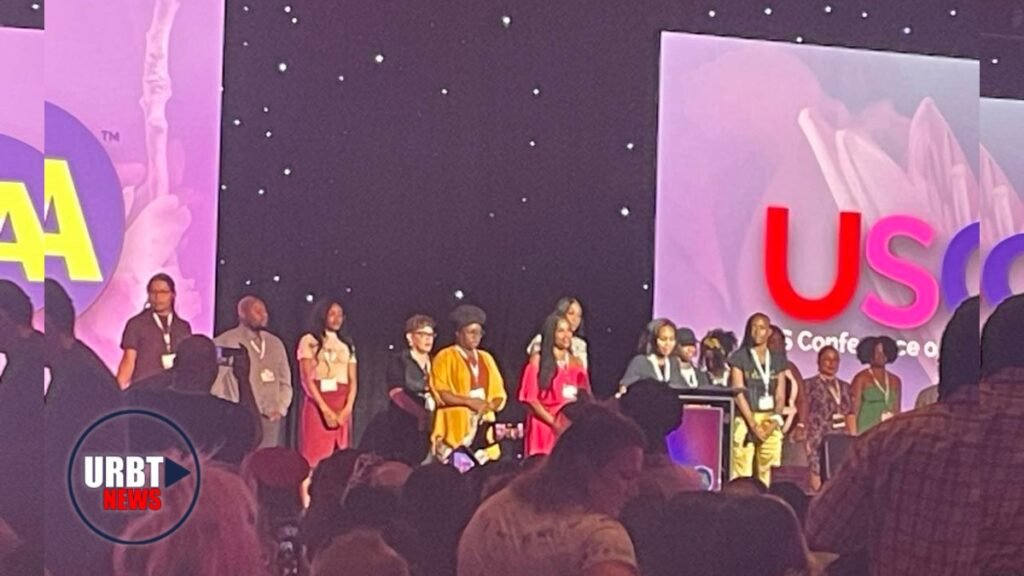
PHOTO: “Dandelions” from Dandelion, Inc. presenting during the Opening Plenary session at the 2023 United States Conference on HIV/AIDS (USCHA). PHOTO: COURTESY: File. Dated September 6, 2023.
During their presentation, one “Dandelion” said, “The system is failing us.” This brave group of young people concluded their presentation by leading a crowd of approximately 4,000 in attendance in an impassioned, minus-long chant of “We are here! We are here!”
According to NMAC, thirty-five percent of the attendees at 2023 USCHA are living with HIV. That equates to 1,400 individuals.
Meet Congresswoman Maxine Waters

PICTURE: Congresswoman Maxine Waters of California. PHOTO: COURTESY: Rep. Maxine Walter’s X profile.
Representative Maxine Waters is an American politician serving as the U.S. representative for California’s 43rd congressional district since 1991. The district, numbered as the 29th district from 1991 to 1993 and as the 35th district from 1993 to 2013. The district includes much of southern Los Angeles, as well as portions of Gardena, Inglewood and Torrance.
Codified in 2006, Congresswoman Waters founded the Minority AIDS Initiative (MAI). The MAI is included under Ryan White HIV/AIDS Program Part F. The MAI provides additional funding under the Ryan White HIV/AIDS Program Parts A, B, C, D, and F. Its purpose is to improve access to HIV care and health outcomes for racial and ethnic minority populations disproportionately affected by HIV.
Under Part F, MAI funds are for increasing the training capacity of AIDS Education and Training Centers to expand the number of health care professionals with treatment expertise and knowledge about the most appropriate standards of HIV-related treatments and medical care for racial and ethnic minority adults, adolescents, and children with HIV.
Congresswoman Maxine Waters on HIV
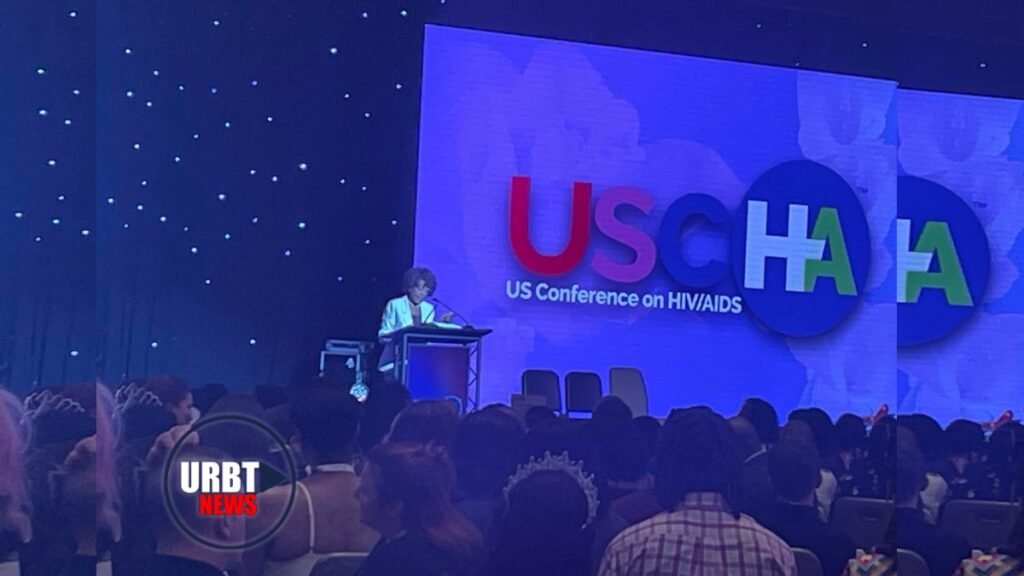
PHOTO: Congresswoman Maxine Waters presenting during the Opening Plenary session at the 2023 United States Conference on HIV/AIDS (USCHA). PHOTO: COURTESY: File. Dated September 6, 2023.
During her passionate speech, Representative Waters, a fearless and outspoken advocate, said, “The Black community is always the last to get the attention and fund and testing.” She added, “We can do better than this!”
“We need the funding,” stated Congresswoman Waters. Later, she added, “The money is coming home!”
With regard to this year’s them, “A Love Letter to Black Women,” Waters remarked, “We don’t need a letter, we love ourselves.” This straightforward statement generated a rousing round of applause and exclamations in agreement.
In a World AIDS Day 2020 press release, Representative Waters stated, “In honor of the millions of people we have lost to HIV/AIDS, I vow to continue my fight to keep our communities healthy and put an end to the HIV/AIDS pandemic once and for all.”
As a congressional leader in the fight against HIV/AIDS, Congresswoman Waters issued the following statement in recognition of World Aids Day in a 2019 press release, “World AIDS Day is a time to reflect on the progress we have made in our fight against HIV/AIDS, honor those who have died, and unite in worldwide solidarity to give hope to the 1.1 million Americans, and the 37.9 million women, men, and children worldwide who are living with HIV/AIDS.”
She. Her. Hers.: Uplifting the Voices of Black Women of Faith in HIV
Historically, Black women have been the most influential demographic in civic, health, education and faith-based settings. The role they played in HIV/AIDS advocacy, awareness and stigma reduction have been trailblazing, essential and empowering. Especially within male-dominated religious hierarchy, women have been able to reimagine and reframe for their communities why and how working to address HIV/AIDS in their respective community is the embodiment of Christian ideologies.
This Faith Pathway institute celebrated Black women of faith in HIV; through a moderated discussion on the role of Black women of faith in HIV prevention and education and look at current landscape of the epidemic. Attendees viewed the screening of the documentary film Black Church, Black Preacher, Black Woman. This film follows a Black, heterosexual, HIV-negative, female pastor working to eradicate the stigmas associated with community health disparities in the South.
“Black women continue to be trailblazers, not only in this space, but in life.” Black women “put the ‘power’ in empowerment,” said moderator Pamela Price.
Rev. Deborah Hickman, co-founder of Sisters Together And Reaching (STAR), was the presenter in session. STAR is a leading faith- and community-based organization that advocates and provides optimal heath, and wellness to underserved and at risk minority communities in a holistic, faith centered environment. STAR addresses unfairness and gaps in service delivery for minority women and men at risk or living with HIV/AIDS and other sexually transmitted infections (STIs), diabetes, cancer, heart disease, and other illnesses.
In this session, Rev. Hickman encouraged attendees to “make certain you are showing up” to “promote the positive.” As a call to action, she added, “Always make sure others dignify you,” because “nobody can take your voice away…Stand up!” She remarked, “When you give your power to a whole lot of nothingness, you lose sight of the mission.”
HIV/Aging Policy Bootcamp
I attended the “HIV/Aging Policy Bootcamp: Building Skills for Equity and Inclusion” policy advocacy workshop after the Opening Plenary. This institute focused on the unique challenges that older adults living with or at risk of HIV face. In the United States, 50% of people living with HIV are 50 or older. This figure is expected to rise to 70% by 2030. Comorbidities, social isolation, financial insecurity, and stigma/discrimination are all more likely in older adults with HIV.
Participants were educated on policy actions to promote equitable and inclusive care. This includes removing age limits on HIV testing guidelines and implementing the Older Americans Act to be more HIV-inclusive. The bootcamp also discussed advocacy for the LGBTQ+ and HIV Long-Term Care Bill of Rights. The HIV Long-Term Care Bill of Rights ensures access to safe, respectful long-term care services free of discrimination and stigma. Participants met in small groups to discuss policy advocacy strategies and community organizing efforts aimed at improving the quality of life for older adults living with or at risk of HIV.
Comorbidities, social isolation, financial insecurity, and stigma/discrimination are all more likely in older adults with HIV. The workshop educated participants on policy actions that promote equitable and inclusive care. This includes eliminating age limits on HIV testing guidelines and making the Older Americans Act more HIV-inclusive.
The boot camp also discussed advocacy for the LGBTQ+ and HIV Long Term Care Bill of Rights. The HIV Long Term Care Bill of Rights ensures access to safe, respectful long-term care services free of discrimination and stigma. Participants met in small groups to discuss policy advocacy strategies and community organizing efforts to improve the quality of life for older adults living with or at risk of HIV.
Detangling Criminalization
The “Unraveling Molecular HIV Surveillance: Detangling Criminalization from Public Health Activities” workshop discussed how public health officials use HIV viral sequence data without consent from people living with HIV. This further stigmatizes and puts at risk for surveillance and criminalization, especially in BIPOC communities.
Our privacy to our health data cannot be funded and used this way!
As stigmas and disparities continue to rise against people living with HIV the nation struggles with prioritizing people living with HIV. A major concern with the HIV community is Molecular HIV Surveillance (MHS), a CDC-funded program that attempts to use genomic HIV sequences to track and identify networks of people living with HIV. The program’s problems include the lack of consent and autonomy from participants, and the lack of community consultation.
This workshop placed these issues within the broader context of increased stigma on targeted communities. The broader context also included the erosion of privacy and data protections, and intensified criminalization. Most of these disproportionately affect marginalized communities such as Black, indigenous and people of color (BIPOC), LGBTQ+ individuals, people who use drugs and sex workers. Currently, there are various HIV advocate groups raising the concerns from people living with HIV and the deterrent effects it has on participation in public health programs.
U=U (Undetectable = Untransmittable)
The workshop “Storytelling: What U=U Means to Four Women of Color” featured short videos. The videos depicted the interwoven stories of four women of color from diverse backgrounds, all long-term HIV survivors. The videos were created by the Primary Care Development Corporation (PCDC) and the New England AIDS Education and Training Center (NEAETC) to educate healthcare professionals about the significance of U=U (Undetectable = Untransmittable) to people living with HIV.
Each video demonstrated the importance of honest communication between providers and clients, as well as their strength, power, and resilience.
The storytellers featured in the videos shared their experiences participating in the project. They also shared its impact on them during this highly interactive workshop. Participants discussed their reactions after watching the videos together. They discussed U=U with the storytellers, how providers could become more comfortable discussing it, and strategies to sustain these efforts.
Discrimination Into Motivation

PICTURE: Fundación Latinoamericana De Acción Social, Inc. (FLAS). PHOTO: COURTESY OF: Fundación Latinoamericana De Acción Social, Inc. (FLAS) Facebook page. Post Dated January 25, 2023.
The last workshop of the day was the “Turning Discrimination into Motivation” workshop. In this workshop,
“We are humans, and we expect to be treated with dignity and respect,” said Ella Chino. Chino founded Fundación Latinoamericana De Acción Social, Inc. (FLAS). FLAS is a community-based nonprofit organization that uses outreach to advocate against the stigmatization of marginalized and poor communities.
One key point to turning discrimination into motivation is seeing many people die from complications of AIDS in the early 1990s. Another motivating factor is the stigma and fear about HIV/AIDS in our communities. A third motivation reminder is the ignorance, taboo, fear and discrimination in our society about the subject of HIV. The stigma fear-based ignorance and discrimination about HIV/AIDS can even lead to people living with HIV dying alone in their friend’s houses, for example, instead of being with their family members.
A fourth key point to turning discrimination into motivation is the need and demand of HIV/AIDS education and services in Spanish. Another motivation reminder is the homophobia and misconceptions about HIV in the LGBTQ+ community. Poor cultural competence and appropriate services for Latinos is yet another motivation.
After sharing her personal story, Ella explained that because of the traumatic life experiences and ongoing discrimination she faced in her earlier years, she wasn’t worried that she wanted to die. She was worried that she wanted to live.
We are all on this Earth for a reason. Ella’s purpose is to break down barriers. After all, as Hosea 4:6 NIV says, “My people are destroyed for lack of knowledge.”
Welcome Reception
The first day concluded with a Welcome Reception in the Marquis Ballroom of the Marriott Marquis.
Related URBT News article: HIV/AIDS Leaders Gathered on Capitol Hill to #SaveHIVFunding
DOWNLOAD THE URBT NEWS APP Day 1 – 2023 USCHA: A Love Letter to Black Women
You may like
-


Federal Agents Kill Man in Minneapolis, Sparking National Outcry
-


Jason Luv TKO’s Adam22 in Grudge Match: A Battle of Viral Infamy
-


Men Aren’t Chasing Women Anymore: Exploring the Shift in Modern Dating
-


Rogue Elephant Kills 22 in India: Rampage Sparks Wildlife Crisis
-


Florida Ends Permanent Alimony: Understanding the New Divorce Law
-


Vice President J.D. Vance Defends ICE Amid Minneapolis Controversy

